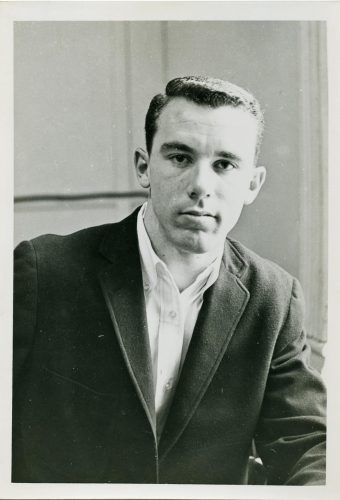THE DAUNTING PERILS OF THE WRITING TRADE

Sports Editor of College Newspaper– circa 1967. The essay is in conjunction with the recent California Newspaper Publishers Association award he received for “Best Column Writing” in the weekly newspaper category.
By Bob Vickrey
Upon returning to the writing life as a newspaper columnist several years ago after a mere 40-year career detour in the book publishing business, I was reminded of the precarious journey a writer faces from their public exposure.
One of the first columns I wrote after my return was published in my hometown paper in Houston as I attempted to capture the essence of growing up in post-WWII suburbia. The piece received prominent positioning on the op/ed page of the Sunday edition of the Houston Chronicle, which immediately triggered numerous responses from old friends and classmates in the area who had noticed my byline.
Several messages began, “Bobby, is that you?” which informed me immediately that this was likely from an old classmate that only recognized me by my boyhood moniker. One of the first responses to the lengthy autobiographical piece I had slaved over for several weeks began: “Who do you think you are—F. Scott Faulkner?” My former classmate Clarence may have been guilty of mangling his Southern writers’ names, but was perhaps making a larger point about my writing style being a bit too ethereal and high-minded—or as Clarence so eloquently put it: “Too fancy-schmancy for me.”
Those were the illuminating insights of my grammar school friend who made it all the way through the eighth grade before eventually being sent away for several years to make license plates for the state of Texas. So, after considering Clarence’s candidly-worded criticism, I immediately signed him up as my writing coach from his cell block in Huntsville.
A few weeks later, I worked diligently on a column about commentator Bill Moyers’ return to his PBS television show after a lengthy absence. The piece was—at least in my estimation—a tempered and well-nuanced essay on Moyers’ innate ability to unravel the political complexities that we face in everyday life. And right on schedule the following day, Clarence’ short message read: “This story sucks!”
I eventually decided to relieve Clarence of his duties as my writing coach, but will always remember being charmed and enamored by his simple eloquence. I feel secure in knowing that he will surely find work as the literary critic for the Huntsville Inmate Times.
I first remember writing a football story while I was a player on the seventh grade team—or more precisely—a permanent bench-warmer on that team. Knowing I would not likely be entering the game, I stuffed a pen and paper inside my pants uniform and began making notes on the action I observed. That four-inch story ran in our local weekly paper and should have offered fairly compelling evidence that even back then I had a strong inclination to write.
When my former college journalism professor David McHam spotted one of my columns a few years ago, he sent me a note that read simply, “What took you so long?”
He was right, of course. I had entertained early plans to build a career as a newspaper reporter and columnist after my college years, but somewhere along the way became sidetracked and landed that job in the book trade.
In resurrecting my writing life after retirement, I was quickly greeted with the startling reminder of my own limitations. I had always admired the talents of humorist Nora Ephron and columnist Dave Barry, but it didn’t take long to discover they were famous for a very good reason. I am admittedly envious of the hilariously droll delivery of writers Calvin Trillin and David Sedaris. I still marvel at the lyrical and evocative style of my late friend Pat Conroy, but fully understand that I was blessed with neither his Irish muse nor his Southern roots. However, while working in the daunting shadow of talents like these, I’ve managed to find inspiration in each of their distinctive voices.
After spending many years promoting other writers and their books, I quickly became sympathetic with their plight as I attempted to regain firm footing and lose the rust accumulated during my long absence from writing. After a career spent critically reading other writers’ efforts, I found the shoe was now on the other foot, and discovered a greater appreciation of the writers’ quandary in walking the creative tightrope without assurance of a “safety net” that could save us when we are in full free-fall.
All these years later, I still occasionally receive those encouraging little notes from Professor McHam, but the more pressing question is whether I’ll ever receive the unequivocal endorsement of my former writing coach and tough-minded critic Clarence—from whatever facility he may be residing in today.
Bob Vickrey is a writer whose columns appear in several Southwestern newspapers including the Houston Chronicle, and is a member of the Board of Contributors of the Waco Tribune-Herald. He is a monthly contributor to the Boryana Books website. He lives in Pacific Palisades, California.
Comments
Leave a Reply
You must be logged in to post a comment.



